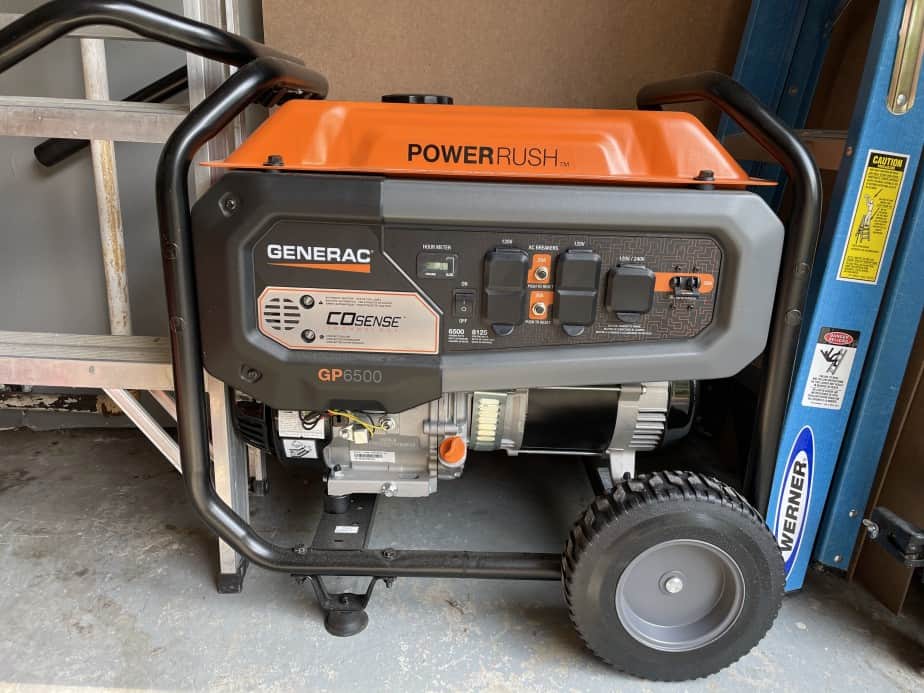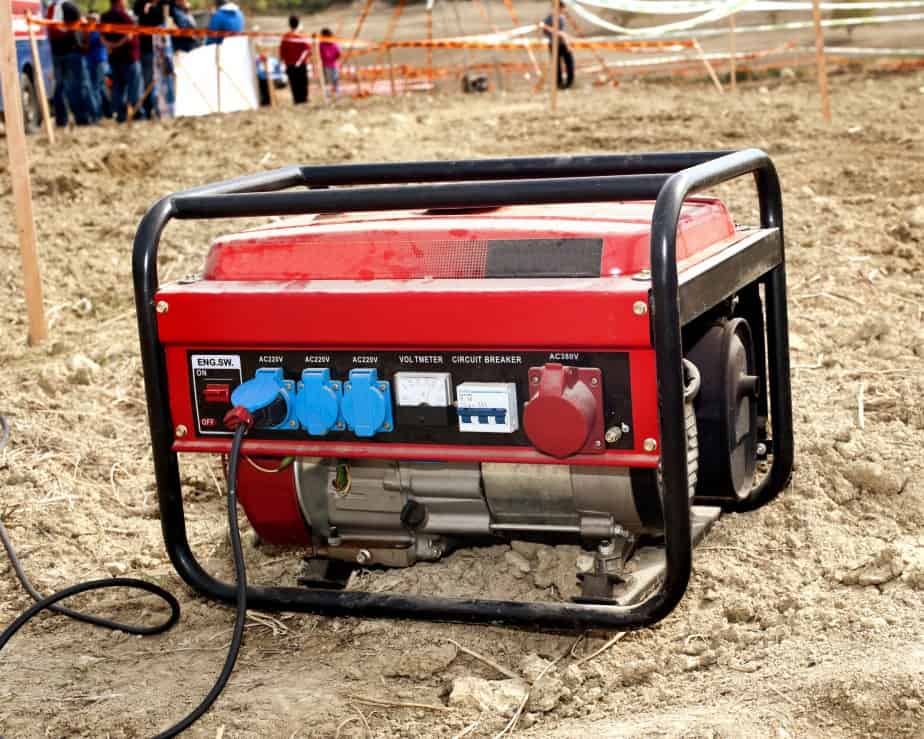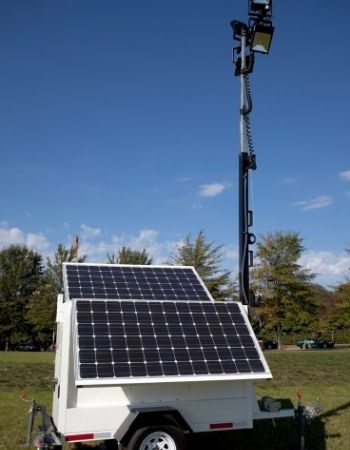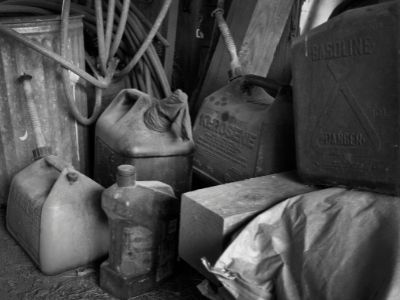Generators are more common than ever before as families look for helpful solutions for off-grid or backup power. A good generator can power a home or campsite with ease so you aren’t without important devices or creature comforts. The problem is that those with no prior experience could put themselves at risk through misuse.

Generators are capable of starting fires is used improperly. Generators that use propane or gas are the most dangerous because of the fuel and risks over improper storage or use.
However, there are still fire risks associated with solar power generators. The more responsible you are when setting up and using a generator, the lower your risk.
This idea that isn’t just gas generators that are problematic may come as a surprise. So it is important that we go over some of the different risk factors and precautions for both types of generators. Below you will learn more about the following.
- Why gas generators are so dangerous
- The types of fires caused by gas generators
- Why there are also fire risks when dealing with solar installations
- What you can do to reduce the risk of fire
Table of Contents
Why do generators cause fires?
The first thing to consider here is why a generator may be such a fire hazard. We’re going to start by focusing on propane and gas generators that require fuel to start.
While these aren’t as popular anymore, many homes still have them tucked away in a garage somewhere. These older models are even more dangerous if they weren’t maintained or stored properly or if they are faulty through old age.
The use of flammable fuel like propane is the biggest concern here. A spark from a campfire or cigarette can ignite fumes and tanks of fuel can explode.
Then there is the risk that comes from electrical faults from the generator itself. Bad wiring and connections can lead to short circuits and other catalysts that spark fires.
Finally, there is the fact that too many generator owners don’t set their generators and fuel up in a safe space.
The best way to avoid fires caused by generators is to take as many precautions as possible when setting up, storing, and maintaining your generator and fuel.
Setting up a generator means more than taking it out of storage, adding the fuel or panel, and turning it on.
What types of fires are caused by generators?
Generator explosions and electrical fires can lead to substantial wildfire and property fires depending on the situation.
Property fires can occur when owners use generators too close to their homes. They may set it up just outside the back door or mistakenly believe that they are safe to use it in a garage with the door open.

If the generator catches fire then this can easily spread to flammable materials on the property. These situations are made even worse when people run generators overnight unsupervised or leave fuel supplies next to the generator.
Then there are the risks of wildfires. Generators are a great idea when out on camping trips as they supply power to essential appliances on the campsite or in an RV.
However, there are the same risks that come from placing a generator in the wrong place or leaving it unattended. A generator that catches fire in the great outdoors can quickly ignite vegetation and cause substantial bushfires.
The same is true for any propane tanks that catch fire.
A real-life example of the dangers of generators comes from California during a public safety power shut-off.
The purpose of these shut-off periods is to reduce the risk from any damaged power lines. In this situation, officials cut the power to 48,000 people in the Sierra foothills.
Naturally, many turned to alternative forms of power generation in order to keep the electricity flowing.
But, not all residents were up to speed on generator safety and there were some severe fires. As areas like California struggle more with wildfires and the need for these large-scale planned blackouts, the demand for generators will rise.
Without better information on generator safety, the risk of subsequent fire could also increase.
Can solar power generators catch fire?
So far, we have focused mostly on propane generators and other systems with dangerous flammable fuels.
It is easy to see why these pose such a risk because you are dealing with two dangerous elements with the fuel and the electrical device.
But what about solar power generators? Are they any safer?

Solar power solutions are increasing in popularity because they are the greener way to go off-grid. There are also fewer safety concerns about the source of the power when all you rely upon is the sun.
There is a significantly reduced risk of fire as you don’t have to worry about using or storing those flammable fuels.
However, that doesn’t mean that you can get complacent or neglectful with solar power generators. They are still complex electronic devices that could malfunction with improper use, storage, or maintenance.
You also need to think about the solar panels and any battery packs you may have.
There aren’t that many cases of solar panels catching fire. A well-made panel with good wiring and housing should be perfectly safe to use.
A good generator should also have enough safety precautions with over-charging, voltage, and short-circuit protection to minimize any risks there.
However, cheaper panels or those that sustain wear or damage to the wiring and connectors could be a problem. Make sure to always go for a quality product from a well-known brand.
A bigger issue with solar power generation comes from battery banks. A battery bank is a way of storing power from solar generators for later use.
Some smart homes will have battery banks installed within the building or in a garage. The Tesla Powerwall is a well-known example.
There are concerns that improper use and overloaded batteries could lead to the release of toxic flammable gases and extreme temperatures. Battery fires are rare, but the more significant incidents are hard to ignore.
The “Victorian Big Battery” project in Australia, using the Tesla Megapack, malfunctioned and caused a blaze that lasted for three days.
How to set up a gas generator to reduce the risk of fire
For a start, you need to make sure that it is far enough away from your property and flammable materials just in case there is an emergency. The recommendation is to be at least five feet from all doors and windows with the exhaust facing away from the home.
But, the further the better. It is also vital to read all the safety and operational guidelines on any new generator.
You also need to be sure that the rest of the family stays well away from it. You don’t want the kids or pets getting too close to the fuel or running the risk of knocking something over.
On that note, you also need to make sure to set the generator up on even ground. Consider getting a model with a stand on wheels to make it easier to get far enough away from the garage and to offer a more stable base.
Once up and running, make sure it isn’t unattended for long. There should always be someone at home with the generator running. It should also go without saying that you should never set up a generator near any campfires or other open flames.
Nor should you smoke around a working gas generator. Also, when it is time to refuel the generator, turn it off and let it cool down completely. Adding flammable fuel to a hot machine is highly dangerous.
How to store gas generators and fuel to reduce fire risks
Once the blackout or camping trip is over, you will need to put your generator and remaining fuel back into storage. Find a secure spot in an outbuilding where there are no additional risks from an electrical system or other flammable materials.

Keep the generator in a safe dry place where you can easily get to it for cleaning and maintenance.
Keep the fuel out of reach where it won’t be disturbed. Also, make sure to drain the generator of fuel and clean it before storing it.
Finally, it is always better to be safe than sorry if you have any doubts about an old generator.
Perhaps you have an old model in an out-building for emergencies that hasn’t seen action for a few years. You may have your doubts about its effectiveness and safety.
If so, get a new model and consider going for that safer and cleaner solar power instead.
In short, there are some significant fire risks when misusing propane generators and their fuel. But, you can reduce those risks significantly with proper use, storage, and maintenance.
Solar systems are safer, but not completely risk-free. So, make sure you stay vigilant, avoid common mistakes, and teach the rest of the family how to behave around them.